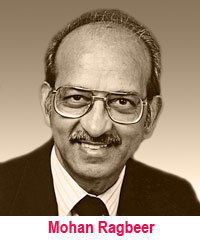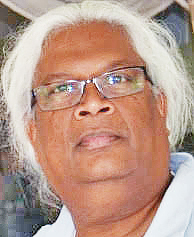Opinions
A Guyanese Farce

The APNU/AFC coalition government lost a no-confidence motion on the vote of AFC’s Charrandas Persaud. A shocked Volda Lawrence, PNC/R Chair, and David Patterson, Minister of Public Infrastructure, sitting in front of Persaud spun around, while to his left, a stunned Jermaine Figueira demanded, “what the [expletive] you doing.” In voting yes, Persaud had ignored Figueira, who directed that he should “do the right [expletive] thing”! Another colleague, Rajkumar (Haimraj) advised, “you can vote again; say no,” to which Persaud replied, “Buddy, I already voted.” “Well
you got to vote again. You can change it,” Raj-kumar said, while APNU’s Rajkumari Bancroft cried out, “No. Charrandas, say no. Correct yourself. Correct it to no. No, no, no.” With no correction by Persaud, Bancroft asked, rhetorically, “Why Charrandas behaving like this?” This shows how low partisan politics had sunk in Guyana; you vote as directed; the exchange sounded like a grade 2-3 argument on a cricket pitch. The overbearing effort to change Persaud’s mind was troubling and reminds me so much of the old PNC, and makes pre-Burnham politics look good! At least then, House behaviour was civil. The motion won 33 to 32. But AG Williams, displaying acrobatic skills with math that would have astonished Aryabhatta, Ramanuj or EO Pilgrim, decided that the minimum majority in a 65 assembly was 34-31, not 33-32. By his argument, every Government measure passed on a 33-32 majority vote was invalid. Does that include the Government majority itself? Thus its legitimacy? Later, Williams invoked Persaud’s dual citizenship as disqualifier; but paragraph 173 (2) of Guyana’s Constitution states: “…the presence or participation of any person not entitled to be present at or to participate in the proceedings of the Assembly shall not invalidate those proceedings.” Besides Persaud, a dozen MPs are dual citizens, including Ministers Gaskin, Greenidge, Roopnarine, Harmon, and Teixeira. Various sections of the constitution disqualify aliens; Commonwealth citizens are not considered aliens; that disqualifies US citizen Harmon, but not the Canadian, Persaud.
But what a sickening show of venom was spitted at the man, enough for a lethal nest of Guyanese labaria! One shrill columnist named Y. Sam was particularly nasty, showing how superficial the Party acceptance of Indian colleagues was; would she similarly flay others, say, Roopnarine or Harmon? While unsolved crime permeates the society and clutters Police blotters, much time and energy will be spent by Commissioner James, Minister Ramjattan and others, to carry on the charade and comb the hemisphere for something illegal to pin on Persaud. Wrong will out, so why torment the man for his constitutional stance? The Guyana Constitution is a mess; it is best scrapped and a new one written. The current problem underscores the urgency.
From the start of APNU/AFC rule, I had noted how pushy they were, with a majority of just one! I saw another looming racial dictatorship, and, as Jamaicans say, we were exchanging “black dog fe monkey”! Granger’s first major act lost me his support: they raised Ministers’ pay by a hefty 50%, plus fat benefits, ignoring productive and needier elements among government workers e.g. teachers, policemen, the UG etc. Graft and extortion by police continued. On a trip to Skeldon in 2017, our car was stopped twice each way and the driver paid the officer $10,000 each time. The majority are still in need. Teachers, who identify with APNU/AFC eventually struck against them. The expensive SARA and SOCU recovery and investigation campaigns against PPP/C wrong-doers, under black sociologist Clive Thomas (salary $4.7M per month) have failed. APNU/AFC cleared GECOM down to the wastebaskets, and installed a frail elderly in charge, removing even the few honest and competent PPP appointees! Paving the way for an APNU win next elections, a reprise of Guyana 1968. Civil servants were racially purged, and even junior ministers became pushier; soon the AFC became nothing; even the PM was emasculated. Moderates like David Hinds were cut from the Chronicle, a government paper.
With oil discovery you could sense the expectancy and whetting of greedy appetites. An early oil bonus from Exxon was withheld from the Consolidated Fund. The losses at the Local Government Elections were an eye-opener, and Volda Lawrence’s assertion of providing jobs for PNC members only, angered many; it was an outrageous statement, awful enough unspoken, but published, the death of any hope for non-members, recalling Burnham’s paramountcy of the Party and the omnipotent PNC card, so that even the corrupt PPP/C begins to look less crooked, emboldening Jagdeo to move a no-confidence motion against them.
But what a sickening show of venom was spitted at the man, enough for a lethal nest of Guyanese labaria! One shrill columnist named Y. Sam was particularly nasty, showing how superficial the Party acceptance of Indian colleagues was; would she similarly flay others, say, Roopnarine or Harmon? While unsolved crime permeates the society and clutters Police blotters, much time and energy will be spent by Commissioner James, Minister Ramjattan and others, to carry on the charade and comb the hemisphere for something illegal to pin on Persaud. Wrong will out, so why torment the man for his constitutional stance? The Guyana Constitution is a mess; it is best scrapped and a new one written. The current problem underscores the urgency.
From the start of APNU/AFC rule, I had noted how pushy they were, with a majority of just one! I saw another looming racial dictatorship, and, as Jamaicans say, we were exchanging “black dog fe monkey”! Granger’s first major act lost me his support: they raised Ministers’ pay by a hefty 50%, plus fat benefits, ignoring productive and needier elements among government workers e.g. teachers, policemen, the UG etc. Graft and extortion by police continued. On a trip to Skeldon in 2017, our car was stopped twice each way and the driver paid the officer $10,000 each time. The majority are still in need. Teachers, who identify with APNU/AFC eventually struck against them. The expensive SARA and SOCU recovery and investigation campaigns against PPP/C wrong-doers, under black sociologist Clive Thomas (salary $4.7M per month) have failed. APNU/AFC cleared GECOM down to the wastebaskets, and installed a frail elderly in charge, removing even the few honest and competent PPP appointees! Paving the way for an APNU win next elections, a reprise of Guyana 1968. Civil servants were racially purged, and even junior ministers became pushier; soon the AFC became nothing; even the PM was emasculated. Moderates like David Hinds were cut from the Chronicle, a government paper.
With oil discovery you could sense the expectancy and whetting of greedy appetites. An early oil bonus from Exxon was withheld from the Consolidated Fund. The losses at the Local Government Elections were an eye-opener, and Volda Lawrence’s assertion of providing jobs for PNC members only, angered many; it was an outrageous statement, awful enough unspoken, but published, the death of any hope for non-members, recalling Burnham’s paramountcy of the Party and the omnipotent PNC card, so that even the corrupt PPP/C begins to look less crooked, emboldening Jagdeo to move a no-confidence motion against them.
Finding heroes in our new world
 Romeo Kaseram
Romeo Kaseram
Perhaps it was ‘Teach’ who inspired us as young students to discover our home-grown heroes.
Those were the days back home, when attending kindergarten, and later primary school, we were inundated with text books that glorified distant lands, and valorised foreign heroes drawn with muscular arms, wide chests, and legs thicker than coconut-tree trunks, with jutting, prominent jaws as shapely as the iron vices used to grip heated iron bars in our school workshop. Then we did not have to journey far for inspiration in order to construct our foreign heroes;
at least no further than the comics section in the newspapers that were delivered each morning. Tossed onto the front steps, or stuffed in a tube with waterproof caps on both ends that were nailed to the top of our front gates, the newspapers were still fresh with news that had not yet reached us, and filled with fictions of foreign men and women who leapt over tall buildings that were yet to be constructed in our part of the world, and who halted hurtling super-fast passenger trains that were yet to arrive among our swaying fields of sugar canes, in order to save swaths of humanity from untimely and crushing deaths.
That the latest news had not yet reached us meant radios were solid-state heavy-weights, few and expensive, the glowing tubes inside its bowels similar to those in the backs of the one or two black and white televisions, also wholly unaffordable, and accessible by a handful of villagers fortunate enough to live in high-houses with running water, electricity, and corrugated-iron roofs.
This was also the time when news from abroad arrived twice a day via pen-pal posted envelopes thickly encrusted with licked stamps. Even the top right corners of the envelopes told a story of foreign places through landscapes colourful and alien, which were printed on the minimalist real estate, with each stamp worthy of wonderment and day-dreaming, which when clipped found longevity through retention and acquisition in rows upon rows meticulously glued inside used copybooks.
It was from the comics section of newspapers where as schoolboys we projected the possibilities of super-human strength onto the school yard, imitating with whoops and howls the primal calls of Tarzan, king of the apes, swinging from the manicured, low branches of the school compound’s treasured Samaan tree. Other low-hanging fruit of mimicry saw us approaching groups with the silence and inscrutability of the protagonist in the running series, Phantom. In our teacher’s absence during recess, when he retreated to tease “Miss” in the sanctuary of the staff room, we leapt, or tried to with super-student effort, but mostly with mediocre grades, over our tall, wooden desks with failing, single bounds.
Such was our impact in the narrow world of our school, the influences of foreign worlds constantly shaping our young minds, so what we reproduced in our play, our imitation, and our mimicry, was the insidious ideologies of the patriarchy, of racism, and domination by the privileged over the underprivileged. These were the lessons continually inscribed in our young minds as undetectable undercurrents through the fictions that we innocently absorbed and re-enacted during recess play in our schoolyard.
“Look at me! I’m Superman,” one classmate exclaimed, after tying a towel on as a cape, running with hands held outwards, piercing his way like a diver through a sea of scattering girls in the school’s courtyard. Another classmate, who wearing a cardboard mask, pretended to be an intrepid Phantom by commanding a few classmates to become willing slaves, then sending them off on a rescue mission by the row of women gathered to sell recess snacks.
But ‘Teach’ was observant. Standing by the half-opened Demerara window of the staff room, he watched our leaping, our caterwauling, those spasms with make-believe pain, and its overpowering of our young minds. He stood in his shoes, arms folded and with a grim chin, looking at us being swept away by foreign narratives, and wondered.
I recall the following items he brought to the classroom: a book, which he read to us about the cricket legend, Gary Sobers. I distantly recall its childhood biography – Sobers as a young boy, breaking an arm, and learning to bowl with the other arm. I took away this narrative as an inspiring tale of perseverance in the face of a setback. He brought us two cricket bats, and tennis balls discarded for its lack of bounce. We were taught to bat, field, and to umpire during recess breaks, while ‘Miss’, who now neglected by ‘Teach’, looked on wistfully at times with arms folded in annoyance from the opened half of the staff room’s Demerara window.
The boys grew to love our recess games of cricket, the courtyard filling up with excited shouts of “Catch him!!”, that replaced the guttural yodeling of Tarzan. Then, in an oral exam, ‘Teach’ put this question to the class: “Who is the greatest hero of our times?” Our reply was in unison, each boy answering at the top of his voice, singing out unequivocally, confidently: “Gary Sobers, Sir! The greatest cricketer on earth!”
That the latest news had not yet reached us meant radios were solid-state heavy-weights, few and expensive, the glowing tubes inside its bowels similar to those in the backs of the one or two black and white televisions, also wholly unaffordable, and accessible by a handful of villagers fortunate enough to live in high-houses with running water, electricity, and corrugated-iron roofs.
This was also the time when news from abroad arrived twice a day via pen-pal posted envelopes thickly encrusted with licked stamps. Even the top right corners of the envelopes told a story of foreign places through landscapes colourful and alien, which were printed on the minimalist real estate, with each stamp worthy of wonderment and day-dreaming, which when clipped found longevity through retention and acquisition in rows upon rows meticulously glued inside used copybooks.
It was from the comics section of newspapers where as schoolboys we projected the possibilities of super-human strength onto the school yard, imitating with whoops and howls the primal calls of Tarzan, king of the apes, swinging from the manicured, low branches of the school compound’s treasured Samaan tree. Other low-hanging fruit of mimicry saw us approaching groups with the silence and inscrutability of the protagonist in the running series, Phantom. In our teacher’s absence during recess, when he retreated to tease “Miss” in the sanctuary of the staff room, we leapt, or tried to with super-student effort, but mostly with mediocre grades, over our tall, wooden desks with failing, single bounds.
Such was our impact in the narrow world of our school, the influences of foreign worlds constantly shaping our young minds, so what we reproduced in our play, our imitation, and our mimicry, was the insidious ideologies of the patriarchy, of racism, and domination by the privileged over the underprivileged. These were the lessons continually inscribed in our young minds as undetectable undercurrents through the fictions that we innocently absorbed and re-enacted during recess play in our schoolyard.
“Look at me! I’m Superman,” one classmate exclaimed, after tying a towel on as a cape, running with hands held outwards, piercing his way like a diver through a sea of scattering girls in the school’s courtyard. Another classmate, who wearing a cardboard mask, pretended to be an intrepid Phantom by commanding a few classmates to become willing slaves, then sending them off on a rescue mission by the row of women gathered to sell recess snacks.
But ‘Teach’ was observant. Standing by the half-opened Demerara window of the staff room, he watched our leaping, our caterwauling, those spasms with make-believe pain, and its overpowering of our young minds. He stood in his shoes, arms folded and with a grim chin, looking at us being swept away by foreign narratives, and wondered.
I recall the following items he brought to the classroom: a book, which he read to us about the cricket legend, Gary Sobers. I distantly recall its childhood biography – Sobers as a young boy, breaking an arm, and learning to bowl with the other arm. I took away this narrative as an inspiring tale of perseverance in the face of a setback. He brought us two cricket bats, and tennis balls discarded for its lack of bounce. We were taught to bat, field, and to umpire during recess breaks, while ‘Miss’, who now neglected by ‘Teach’, looked on wistfully at times with arms folded in annoyance from the opened half of the staff room’s Demerara window.
The boys grew to love our recess games of cricket, the courtyard filling up with excited shouts of “Catch him!!”, that replaced the guttural yodeling of Tarzan. Then, in an oral exam, ‘Teach’ put this question to the class: “Who is the greatest hero of our times?” Our reply was in unison, each boy answering at the top of his voice, singing out unequivocally, confidently: “Gary Sobers, Sir! The greatest cricketer on earth!”
